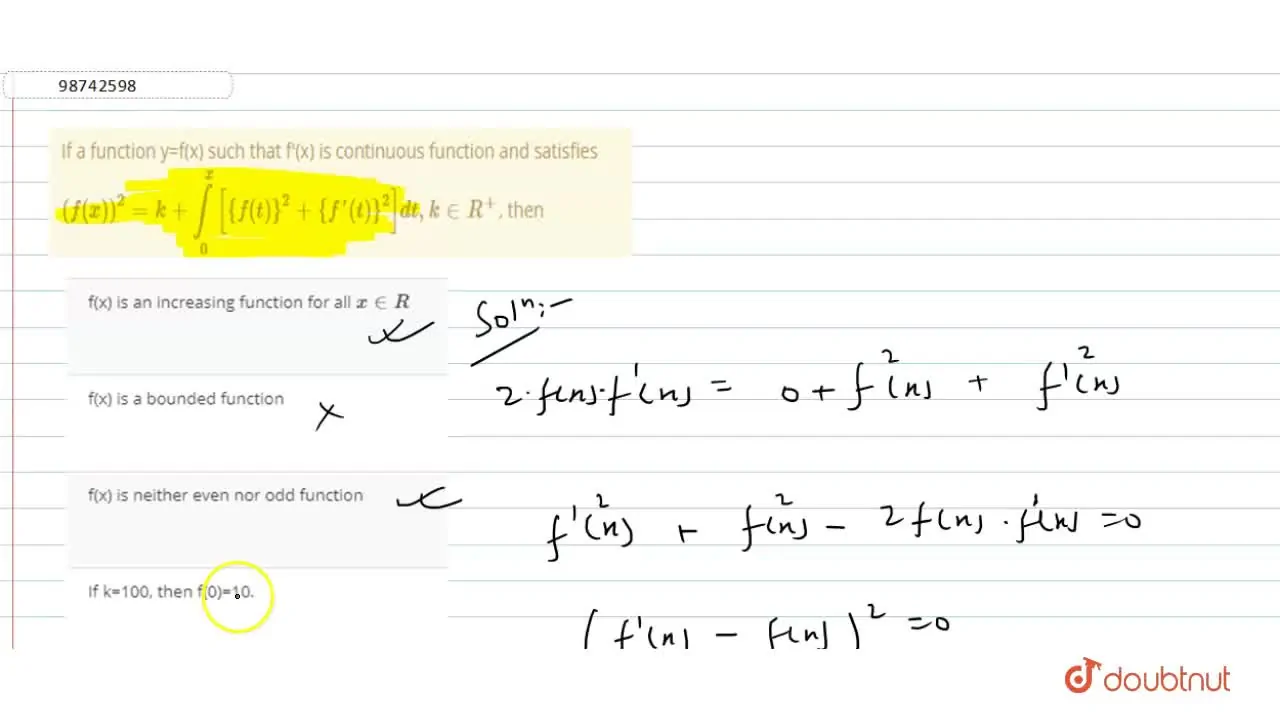If a function y=f(x) such that f'(x) is continuous function and satisfies
(f(x))2=k+∫x0[{f(t)}2+{f'(t)}2]dt,k∈R+, then
f(x) is an increasing function for all x∈R
f(x) is a bounded function
f(x) is neither even nor odd function
If k=100, then f(0)=10.
The correct Answer is:A, C
We have
(f(x))2=k+x∫0[{f(t)}2+{f'(t)}2]dt .....(i)
Differentiating with respect of x, we obtain
2f(x)f'(x)={f(x)}2+{f'(x)}2
⇒{f(x)=f'(x)}2=0
⇒f(x)−f'(x)=0
⇒f'(x)=f(x)
f'(x)f(x)=1
⇒log(f(x))=x+logC⇒f(x)=Cex ....(ii)
Putting x=0 in (i), we obtain
f(0)=k+0⇒f(0)=k⇒C=k
Putting C=k in (ii), we obtain f(x)=kex.
We observe that f(x) is an increasing function for all x∈R and is not bounded. Also, it is neither even nor odd.
If k=100, then f(x)=kex, gives
f(x)=100ex⇒f(0)=100=100
Hence, options (a) and (c ) are correct.
Related Playlists
- BOOK - OBJECTIVE RD SHARMACHAPTER - DEFINITE INTEGRALSEXERCISE - Section II - Assertion Reason Type12videos
DEFINITE INTEGRALS
- BOOK - OBJECTIVE RD SHARMACHAPTER - DEFINITE INTEGRALSEXERCISE - Exercise147videos
DEFINITE INTEGRALS
- BOOK - OBJECTIVE RD SHARMACHAPTER - DEFINITE INTEGRALSEXERCISE - Chapter Test 260videos
DEFINITE INTEGRALS
- BOOK - OBJECTIVE RD SHARMACHAPTER - CONTINUITY AND DIFFERENTIABILITYEXERCISE - Exercise86videos
CONTINUITY AND DIFFERENTIABILITY
- BOOK - OBJECTIVE RD SHARMACHAPTER - DERIVATIVE AS A RATE MEASURER EXERCISE - Exercise26videos
DERIVATIVE AS A RATE MEASURER
Similar Questions
A function f(x) satisfies f(x)=sinx+∫x0f′(t)(2sint−sin2t)dt is
View SolutionA continuous function f(x) satisfies the relation f(x)=ex+∫10exf(t)dt then f(1)=
View Solutionf:R→R;f(x) is continuous function satisfying f(x)+f(x2)=2∀x∈R, then f(x) is
View Solutionf:R→R;f(x) is continuous function satisfying f(x)+f(x2)=2∀x∈R, then f(x) is
View SolutionLet f be a continuous function on R and satisfies f(x)=ex+∫10exf(t)dt, then which of the following is(are) correct?
View SolutionIf a continuous function f satisfies ∫f(x)0t3dt=x2(1+x) for all x≥0 then f(2)
View SolutionLet f be a continuous function on (0,∞) and satisfying f(x)=(logex)2−∫e1f(t)tdt for all x≥1, then f(e) equals
View SolutionIf f is continuous function and F(x)=∫x0⎛⎝(2t+3).∫2tf(u)du⎞⎠dt, then ∣∣∣F2f(2)∣∣∣ is equal to_____
View SolutionA Function f(x) satisfies the relation f(x)=ex+∫10exf(t)dt. Then (a)f(0)<0 (b)f(x) is a decreasing function. (c)f(x) is an increasing function. (d)∫10f(x)dx>0
View SolutionLet f:R→R be a continuous function which satisfies f(x)= ∫x0f(t)dt. Then the value of f(1n5) is______
View Solution


